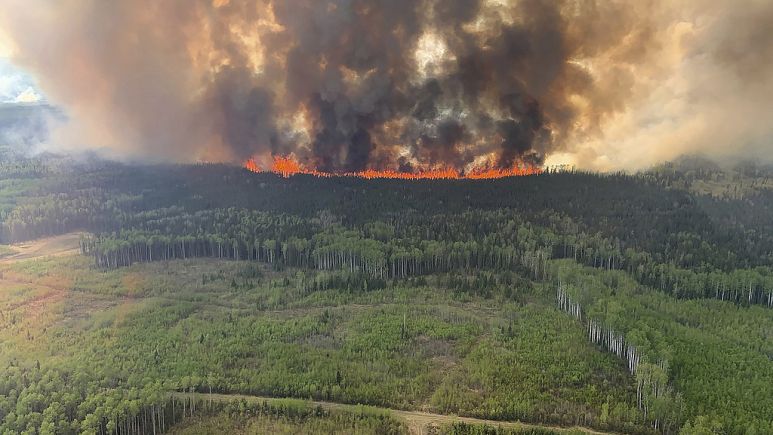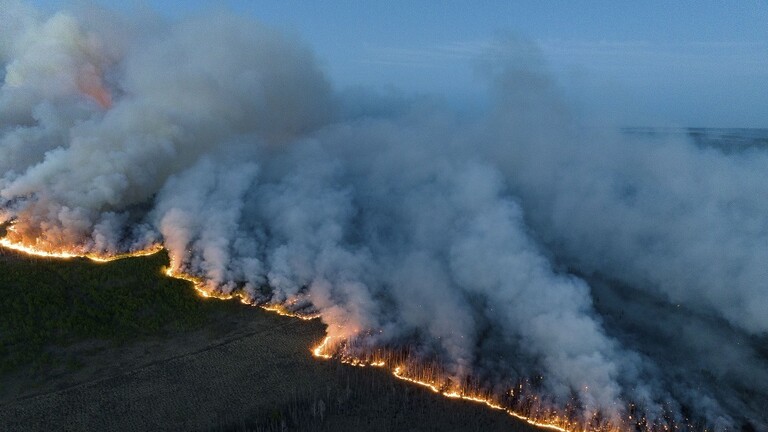Canada's fires are breaking records, burning more than 10 million hectares this year, and are expected to continue for months
Weather of Arabia - Canada's fires broke records and exceed scientists' expectations by burning more than 10 million hectares during this year, and this affected area is expected to increase with the continuation of 906 active fires, of which 570 are out of control.
According to national figures from the Canadian Joint Forest Fire Center (CIFFC), the previous maximum was recorded in 1989 with 7.3 million hectares burning over the entire year.
This large expansion in the scope and number of fires exceeded the capabilities of the Canadian and international firefighting teams, who were present in large numbers, which forced them not to intervene, as the area that was burned during the six and a half months of this year is approximately equivalent to the size of Portugal or the equivalent of the size of Iceland.

Wildfires in Canada - May 12, 2023 - Copyright HO/Government of Alberta
2023 will remain in memory
"This year we are facing numbers worse than the most pessimistic scenario," Yann Boulanger, a researcher at the Canadian Ministry of Natural Resources, told AFP.
"The most shocking thing is that no respirators have been recorded since May. All the elements combine to exacerbate the situation," added Boulanger, a forest fire specialist.
For him, "2023 will remain in memory."
Canada fires exceeded 4,000 fires, claiming the lives of firefighters
Since January 2023, there have been 4,088 fires in total, including many that have damaged hundreds of thousands of hectares and displaced more than 150,000 people , while on Thursday a female firefighter died while trying to put out the fires in western Canada, and two days later a firefighter died Another died while fighting one of the huge fires in the country.

BC Wildfire Service | Anadolu Agency | GettyImages
Statements about the Canada fires
"We are facing a huge scale, the fire we are trying to contain extends over a distance of 65 kilometres, and this poses great organizational challenges," Colonel Philippe Sansa, the commander who leads a 120-strong French fire brigade deployed in northern Quebec, told AFP.
Unlike the west of the country, which is used to large fires, the province of Quebec is not used to such large fires. However, it is the hardest hit so far, with the fires spreading over an area of 4.4 million hectares. The north, like the rest of the country, is facing a severe drought with much lower than average rainfall over recent months, as well as high temperatures.
"We need international help because the resources available in Quebec are insufficient," said Stéphane Caron, spokesman for the Forest Fire Protection Association of Quebec.
Also, in the west of the country, the province of British Columbia has also appealed for international assistance.
"The weather is expected to continue to be hot and dry in the coming months. We don't expect any improvement in the weather soon," said Sarah Budd of the British Columbia Fire Service, which stretches across the Pacific coast.

globallookpress
Fires can stay burning for months
Since the beginning of July, the situation has developed catastrophically in British Columbia, with more than 250 fires starting in three days over the past week as a result of lightning strikes.
"This may be the situation we will face in the future," explained Stéphane Caron, as experts expect the frequency and intensity of fires to increase in northern forests as a result of climate change.
Since the start of the fire season in May, concerns have focused on the province of Alberta, which quickly faced an unprecedented situation. A few weeks later, the Atlantic province of Nova Scotia, known for its mild climate, was hit by huge fires. Due to the density of trees in the boreal forest, the fires may continue to burn for several months.

Pete Laing/BC Wildfire Service
Sources:
Arabia Weather App
Download the app to receive weather notifications and more..



